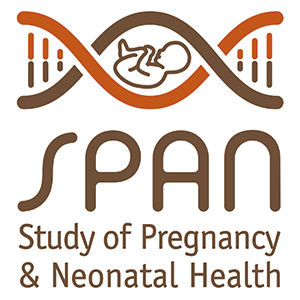Study Objectives
 The overarching goal of the Study of Pregnancy And Neonatal health (SPAN) is to establish a large pregnancy cohort to investigate three main topics.
The overarching goal of the Study of Pregnancy And Neonatal health (SPAN) is to establish a large pregnancy cohort to investigate three main topics.
- Fathers: Paternal cardio-metabolic risk factors and neonatal health
- Genetic fators: Fetal growth and placental aging
- Gestational diabetes mellitus (GDM): Timing of delivery and neonatal morbidity
Study Background
Early life exposures can “program” an individual for health and chronic disease risk through adaptations to biological processes, as proposed by the developmental origins of health and disease (DOHaD) hypothesis. Moreover, genetic factors can influence early growth and development. The health consequences of prenatal exposures and genetic influences can impact not just one individual but multiple generations. The timing of delivery (i.e., gestational age) and birth size are important neonatal outcomes for future health, affecting a range of conditions from mental disorders to cardiovascular disease. The timing and type of prenatal exposures need to be defined to comprehensively understand factors underlying birth size, timing of delivery and their intersection (i.e., size for gestational age). SPAN integrates research approaches in DOHaD, genomics, and clinical trials to understand environmental and genetic mechanisms that underpin key pathways important for health and disease.
Study Design & Progress
This multi-site study will recruit a large cohort of pregnant women and their male partners, oversampling women with GDM. Women will be assessed twice during pregnancy, men will be assessed once, and neonates will be assessed following delivery. Biological samples will be collected from women and male partners, as well as at delivery. Women with GDM will be randomized to timing of delivery.
Principal Investigators
Katherine Laughon Grantz, M.D., M.S.
Fasil Tekola Ayele, Ph.D.
Edwina Yeung, Ph.D.
 BACK TO TOP
BACK TO TOP